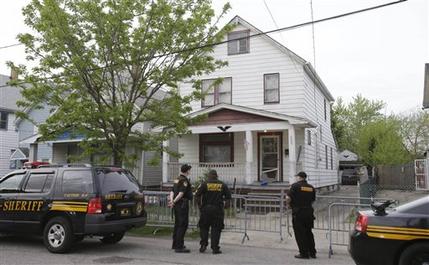CLEVELAND (AP) — The block where horror happened has many faces.

On one end, magnificent stained-glass windows rise two stories up a handsome brick church. At the other end, truck bays open into a bleak warehouse. In between are about 20 houses, some tidy, some with boards or broken glass instead of windows. Back yards melt into a block-long cemetery filled with long grass and crooked tombstones.
In the middle of the Seymour Avenue block stands the home where, authorities say, three young women who vanished a decade ago or more were held captive by a school bus driver and his two brothers.
What kind of place could hide such a terrible secret for so long? And how? On Tuesday, neighborhood residents described a compact world, friendly but cautious, where people keep their heads down and police don’t always protect or serve.
The three women disappeared near this block, which locals call simply “Seymour.” It’s considered a decent place to live in this poor, largely Puerto Rican section of Cleveland’s west side, where stores sell used computers, furniture is rentable, tattoos adorn everyone from teens to grandmas, and you might encounter a pig in a backyard or two.
Police have chased most of the drugs and prostitution away from Seymour, residents say. Neighbors know each other, talk on front porches, share laughs and drinks.
“It’s pretty nice. At night it changes, but that’s everywhere you go. It could be better,” said Richard DeJesus, who lives nearby and whose mother lived on Seymour for years.
It’s also a place where folks don’t pry, because, well – you never know.
“This is Seymour,” DeJesus said. “It used to be a drug-infested area. You talk, you can get hurt up. They’ll come burn your house down. So people will watch, but they’re scared to watch at the same time.”
“We know everyone but still keep to ourselves,” said Juan Perez, who has lived two doors down from the house where the women were found since he was 5 years old. “We stick to family. There are some shady people you don’t know about.”
“We keep to ourselves,” echoed Alexis Lipscomb, who moved onto the block six months ago with her fiancée, whose mother has lived there for years.
Now that Seymour’s secret has been revealed, “I don’t trust anybody, even on my own block,” she said. “It’s creepy, crazy, amazing.”
In some ways, residents say, the bad things were hiding in plain sight.
The owner of the house, Ariel Castro, has been a friendly presence in the neighborhood. He played bass in a salsa and merengue band, was often seen at the park with a little girl, drank with neighbors and gave kids rides on his motorcycle and ATV.
“He was an excellent guy,” said Perez. “If a kid needed a role model, he was the man.”
Castro even helped search for one of the girls after she vanished, said Khalid Samad, a friend of the girl’s family and community activist.
As a bus driver, Castro probably had one of the better jobs on the block, Samad said. And even though the windows of his house were always covered with plastic, that was not an unusual sight amid the abandoned buildings on Seymour.
“In a more affluent neighborhood, maybe people would have asked why he kept his windows covered up and engaged law enforcement,” Samad said.
“I thought it was vacant,” said Perez. “I thought he came by a few times a week to check on it.”
But another neighbor did notice the plastic bags after he heard pounding on the home’s doors. Still another neighbor said a naked woman was seen crawling on her hands and knees in the backyard of the house a few years ago. Both times, neighbors say, police were called and showed up but never went inside.
Their claims were reminiscent of four years ago, when 11 bodies were found at a serial killer’s home in another poor Cleveland neighborhood. Despite the stench of rotting bodies, the house went unsearched for months, and police were accused of not properly investigating because the women were poor drug addicts.
On Tuesday, city Safety Director Martin Flask said that investigators had no record of anyone calling about criminal activity on Seymour, but that authorities were still checking the records.
That made no sense to Lupe Collins, who is close with the victims’ families. “Everyone in the neighborhood did what they had to do,” she said. “The police didn’t do their job.”
On Tuesday, Seymour was crawling with police, media, and neighborhood folks trying to make sense of what was both a tragedy and a miraculous ending.
Some said their guard would be up – permanently.
“I got daughters, man. I work the second shift. I told my wife don’t come out the house when I’m not there. The kids used to ride around on the scooters. No more,” said Christian Ortiz, who lives a few blocks away.
But others planned to lower their walls, if just a bit.
“It takes a village. We gotta go back to the village mindset,” said Perez, who can see the captives’ house from his front porch.
“I’m going to take initiative,” he said. “We need to unite. I’m gonna be the role model he tried to be, but not have the mask covering up the monster.”





